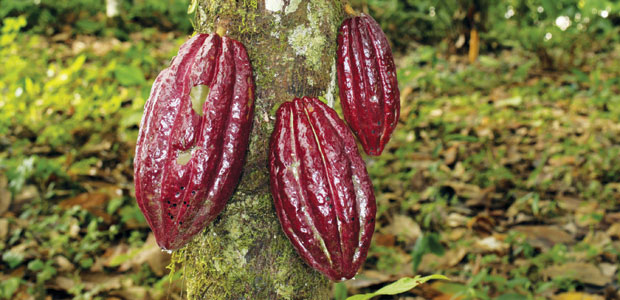Advertisement
Eat Chocolate, Save a Tree
Fair trade practices preserve rainforests

According to Forrest Gump, “Life is like a box of chocolates; you never know what you’re gonna get.” I disagree. When I bite into my favourite fair trade dark chocolate, I know that my palate will receive a flavour explosion while I help to preserve the Big Blue Marble’s lungs.
Chocolate can be a guilty pleasure–especially when consumed in copious amounts during the holiday season. But thanks to new scientific findings, this once-sinful treat is obtaining a stellar reputation. As a first-rate source of beneficial plant compounds called polyphenols, a daily dark chocolate fix can lower blood pressure, reduce diabetes risk, and even boost memory. Now, thanks to forward-thinking manufacturers, it can also aid in preserving the world’s dwindling rainforest.
Jewel of the Rainforest
Cacao trees, the source of cocoa beans that are processed to make chocolate, are grown in tropical regions all over the world. These diminutive trees thrive under the lush canopy of the rainforest where they obtain the correct amount of humidity, precipitation, shade, wind, and nutrients. Along with coffee, cocoa beans are one of the few food crops that can coexist superbly with a forest.
Unfortunately, cocoa beans can be grown in full sunlight as well as shade. For cocoa farmers who are very poor, the lure of increased income from higher yields is a strong incentive for them to pull out their axes and chop trees down, creating sunny plantations that have little biodiversity in flora and fauna.
Ecological Impact
Sadly, as world demand for chocolate grows, more cocoa is being grown on large, nonshade, monocrop plantations. This farming method not only destroys the dwellings of rainforest creatures but also degrades the conditions cacao trees need to grow properly. Why take such an ecologically devastating action? Because, in the short-term, chemical-intensive cacao plantations produce more fruit pods.
Exposing cacao trees to full sun will step up pod production for a few years. But the boost to output (and farmer income) is temporary. These trees will stop producing fruit about 10 years before their rainforest relatives. This leaves a large area of land that is devoid of both the original rainforest and the productive cacao trees. That’s bad news not only for the farmers but also for the macaws and monkeys who’ve lost their habitat. To counteract the effects of global warming, we need all the trees we can get.
Look for the Fair Trade Logo
On the bright side, you can take a bite out of deforestation and put a few more dollars in farmers’ pockets by choosing chocolate this holiday season from sustainable sources of cocoa beans. Chocolate displaying the fair trade logo ensures cocoa farmers are reasonably compensated for their crop and can thus invest in health care, schooling for their children, and more Mother Nature-friendly agricultural practices such as planting native shade trees. An organic label on your sweet treat helps save the planet from toxic fertilizers and pesticides.
Here’s a sampling of companies that satisfy eco-minded chocoholics’ cravings:
Cocoa Camino
(lasiembra.com)–Heavenly assortment of organic, fair trade, and shade-grown chocolate from a Dominican Republic co-operative.
Divine
(divinechocolate.com)–World’s first fair trade chocolate company to be partly owned by cacao farmers.
Dagoba
(dagobachocolate.com)–Extensive line of organic, rainforest-grown chocolate. Going one step further, they also buy renewable energy credits to offset 100 percent of the energy used at their Oregon facility.
Denman Island Chocolate
(denmanislandchocolate.com)–BC company that donates a percentage of the profits generated from its organic chocolate to conservation organizations.
Endangered Species Chocolate
(chocolatebar.com)–Buys their cocoa from small, family-owned properties and sets aside a percentage of sales for the protection of endangered animals and their habitat.
Green and Black’s Maya Gold
(greenandblacks.com)–This product range was the first to carry the fair trade mark in the UK.





